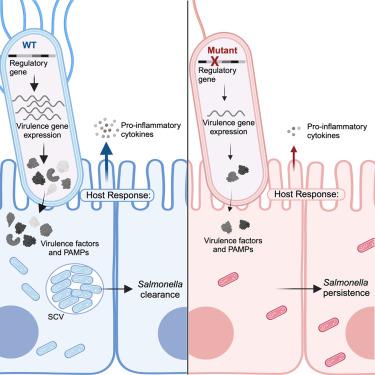Cell Host & Microbe ( IF 30.3 ) Pub Date : 2024-01-10 , DOI: 10.1016/j.chom.2023.12.001 Alexandra Grote , Bar Piscon , Abigail L. Manson , Boaz Adani , Helit Cohen , Jonathan Livny , Ashlee M. Earl , Ohad Gal-Mor

|
Several bacterial pathogens, including Salmonella enterica, can cause persistent infections in humans by mechanisms that are poorly understood. By comparing genomes of isolates longitudinally collected from 256 prolonged salmonellosis patients, we identified repeated mutations in global regulators, including the barA/sirA two-component regulatory system, across multiple patients and Salmonella serovars. Comparative RNA-seq analysis revealed that distinct mutations in barA/sirA led to diminished expression of Salmonella pathogenicity islands 1 and 4 genes, which are required for Salmonella invasion and enteritis. Moreover, barA/sirA mutants were attenuated in an acute salmonellosis mouse model and induced weaker transcription of host immune responses. In contrast, in a persistent infection mouse model, these mutants exhibited long-term colonization and prolonged shedding. Taken together, these findings suggest that selection of mutations in global virulence regulators facilitates persistent Salmonella infection in humans, by attenuating Salmonella virulence and inducing a weaker host inflammatory response.
中文翻译:

人类持续性沙门氏菌感染与 BarA/SirA 调节途径的突变有关
包括肠沙门氏菌在内的几种细菌病原体可以通过人们知之甚少的机制引起人类持续感染。通过比较从 256 名长期沙门氏菌病患者纵向收集的分离株的基因组,我们发现了多个患者和沙门氏菌血清型中全局调节因子的重复突变,包括barA/sirA双组分调节系统。比较RNA-seq分析显示,barA/sirA的不同突变导致沙门氏菌致病岛1和4基因的表达减少,而这些基因是沙门氏菌入侵和肠炎所必需的。此外,barA/sirA突变体在急性沙门氏菌病小鼠模型中被减弱,并诱导宿主免疫反应的转录减弱。相反,在持续感染小鼠模型中,这些突变体表现出长期定植和长时间脱落。总而言之,这些发现表明,全球毒力调节因子的突变选择通过减弱沙门氏菌毒力并诱导较弱的宿主炎症反应,促进人类持续沙门氏菌感染。



























 京公网安备 11010802027423号
京公网安备 11010802027423号